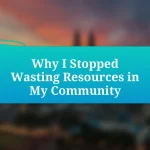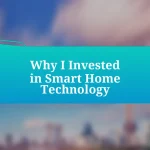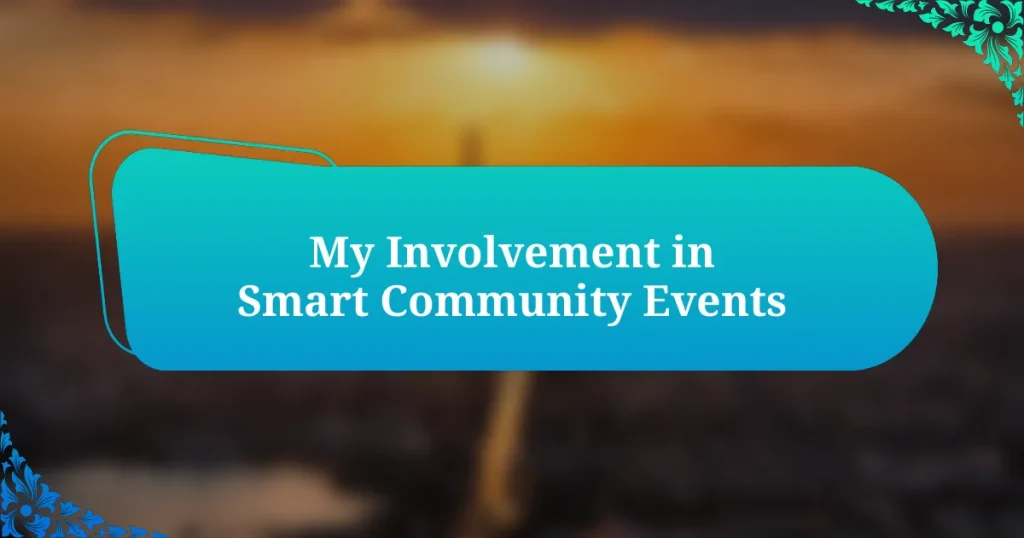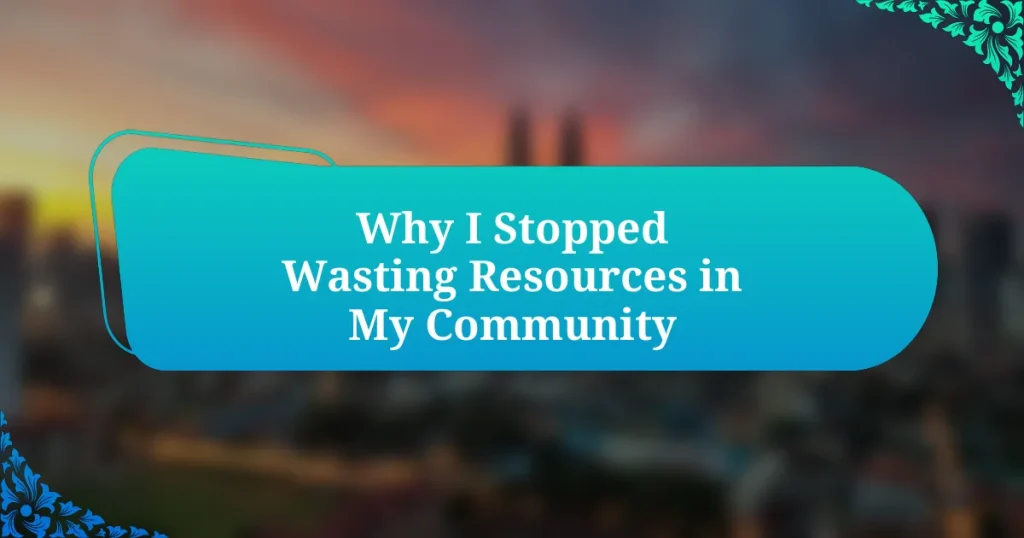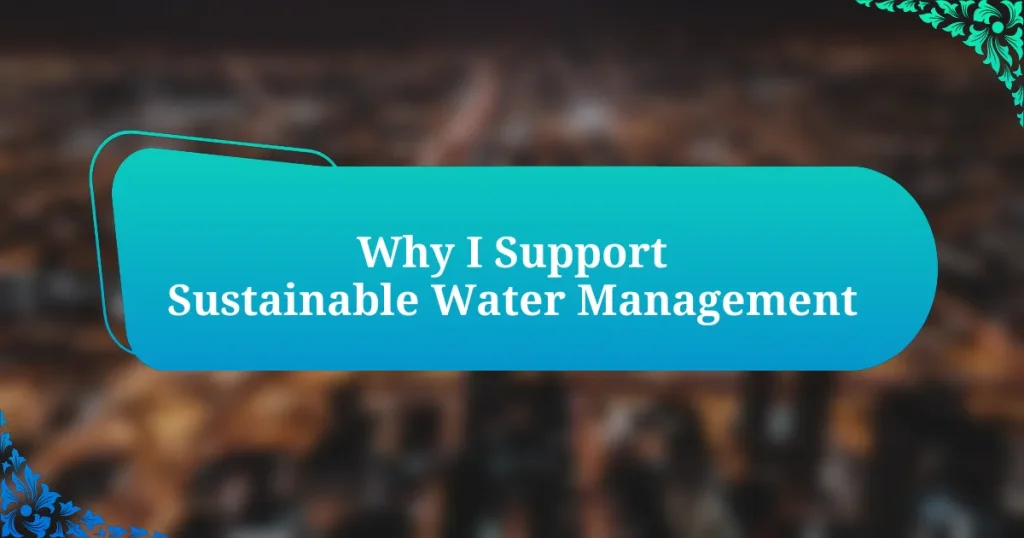Key takeaways:
- Smart city technology enhances urban living through data analytics and interconnected devices, encouraging citizen engagement in shaping local initiatives.
- Community events foster interpersonal connections, promote awareness of smart solutions, and inspire collaborative problem-solving among residents.
- Active participation in smart events leads to personal growth, networking opportunities, and a deeper understanding of emerging technologies.
- Future smart events can benefit from inclusive practices and real-time data analytics to enhance community engagement and responsiveness.
Author: Clara Whitfield
Bio: Clara Whitfield is an acclaimed contemporary author known for her poignant storytelling and evocative prose. With a background in psychology, she intricately weaves themes of human emotion and personal growth into her narratives. Clara’s debut novel, The Echoes of Yesterday, received critical acclaim and garnered her a loyal readership. When she’s not writing, Clara enjoys exploring nature and visiting local coffee shops, where she often draws inspiration for her next story. She currently resides in Portland, Oregon, with her two rescue dogs.
Understanding smart city technology
Smart city technology is a fascinating blend of digital tools and urban management systems aimed at improving the quality of life for residents. I remember attending a workshop where a city official shared how data analytics transformed traffic flow, reducing congestion. Can you imagine how this tech might change our daily commutes?
At the heart of smart city technology are interconnected devices that gather and analyze vast amounts of data. I once participated in a local event showcasing smart sensors that monitor air quality in real time. Witnessing how quickly such information could lead to actionable insights left me inspired and hopeful about our future urban environments.
One aspect that often intrigues me is the role of citizen engagement in smart city initiatives. When I volunteered for a community feedback session, I realized how essential it is for residents to voice their needs. Wouldn’t you agree that technology should reflect our collective aspirations and improve our shared spaces?
Importance of community events
Community events serve as crucial platforms for fostering interpersonal connections among residents. I vividly recall attending a neighborhood festival where I met neighbors I had never spoken to before. It struck me how these casual encounters can lead to stronger community ties and a sense of belonging that benefits everyone.
Moreover, these gatherings often facilitate discussions around local issues, creating a space for collective problem-solving. I once participated in a panel at a community event focused on urban gardening. Engaging with others who shared my passion ignited a collaborative spirit, which ultimately led to the establishment of a community garden. Isn’t this collaboration what we all seek in our cities?
Finally, community events are instrumental in promoting awareness of smart city initiatives. I remember attending a tech fair where representatives explained how smart solutions could address local needs. This experience opened my eyes to what was possible in our area, illuminating the path for greater participation in these transformative technologies. Don’t you think such knowledge helps empower residents to take an active role in shaping their urban environment?
Types of smart community events
One prevalent type of smart community event is the technology showcase, where local innovators present their latest projects. I remember attending a showcase showcasing a smart recycling bin that used sensors to notify collection services when full. Witnessing the excitement in the room as residents interacted with these technologies made me realize how such innovations can re-energize community involvement. Isn’t it fascinating to see how direct engagement with smart tech can spark a collective interest in sustainability?
Another important event format is workshops focused on skill development related to smart city concepts. For instance, I participated in a workshop that taught residents how to utilize mobile applications for public transportation. Not only did I learn practical skills, but the collaborative atmosphere helped forge connections that extended beyond the session. Don’t you agree that learning together can empower communities and enhance their capability to engage with smart solutions?
Lastly, community forums often serve as platforms for discussion and collaboration around smart city initiatives. I recall attending a forum where residents could voice their concerns about traffic management and connectivity. The energy in the room was palpable as everyone shared their ideas, leading to solutions that we could advocate for collectively. Isn’t it empowering to have a voice in shaping the technology that impacts our daily lives?
My role in smart events
During smart community events, I often take on the role of a facilitator, guiding discussions and helping participants navigate their interests in emerging technologies. I distinctly remember one event where I helped organize a panel featuring local tech entrepreneurs. The excitement on their faces as they exchanged ideas with residents was contagious and highlighted how vital it is to create an inclusive space for dialogue. Have you ever felt the thrill of bringing people together to share their unique perspectives?
Another aspect of my involvement is offering mentorship to attendees, especially those who may feel overwhelmed by the technical aspects of smart technologies. I vividly recall supporting a young student who was eager to learn about smart farming solutions. Seeing her eyes light up as she grasped concepts and began to envision how technology could transform agriculture was profoundly rewarding. Doesn’t it feel great to witness the spark of inspiration in someone who might become a future innovator?
Additionally, I engage in the planning and promotion of these events, ensuring that they resonate with the community’s needs. For example, I once led a survey to gauge interest in sustainable tech topics, which informed our event programming. The feedback we received not only shaped the content but also fostered a sense of ownership among community members. Have you noticed how addressing the specific interests of participants can enhance their connection to the event?
Benefits of participating in events
Participating in smart community events offers a unique opportunity for personal and professional growth. I remember a specific event where I networked with industry leaders, leading to valuable connections that opened doors for collaborative projects. Isn’t it inspiring how just one conversation can lead to new possibilities and adventures?
Moreover, attending these events fosters a sense of belonging within the community. I often look around and see people from various backgrounds coming together, sharing their stories and ideas. One time, we facilitated discussions that bridged gaps between local residents and tech experts, resulting in collective brainstorming on using smart technology for community issues. How powerful is it to witness diverse voices merging to create innovative solutions together?
Lastly, engaging in events can significantly enhance one’s understanding of emerging technologies. There was an occasion when I participated in interactive workshops, where hands-on experiences allowed me to comprehend complex concepts more thoroughly. Reflecting on that, I realize that practical engagement makes learning not only more enjoyable but also more impactful. Who wouldn’t want to deepen their knowledge while surrounded by passionate individuals eager to learn and share?
Lessons learned from my involvement
My participation in smart community events has taught me the importance of active listening. At one event, I found myself in a discussion panel where each participant had a unique perspective on integrating technology in urban spaces. I took a step back and realized how much I could learn simply by absorbing different viewpoints, sparking ideas I hadn’t considered before. Isn’t it fascinating how understanding others can ignite your own creativity?
Through my experiences, I’ve also discovered that flexibility is crucial. During a workshop, we faced technical difficulties that forced us to rethink our planned activities on the spot. This unplanned moment highlighted the need for adaptability in such environments. It made me reflect: how often do we let unexpected challenges deter us instead of pushing our boundaries further?
Lastly, I learned that collaboration is most effective when driven by a shared vision. In a community hackathon, my team started with diverse ideas that seemed fragmented, but through open dialogue, we harmonized them into a cohesive project. Witnessing how trust and teamwork transformed our initial concepts into a solid proposal was enlightening. Have you ever experienced the synergy that occurs when individuals unite toward a common goal? It’s a powerful reminder of our collective potential.
Future opportunities in smart events
The future of smart events holds exciting potential for enhanced community engagement. I recall attending a recent event where augmented reality was used to visualize urban development plans. It was amazing to see how technology can bring concepts to life and offer participants a more immersive experience. Could integrating such tech be the key to engaging more community members in revitalization projects?
As I look ahead, I see room for greater inclusivity in smart events. During a roundtable I participated in, several individuals expressed how language barriers affected their engagement. This made me realize that future smart events could benefit from tools like real-time translation technology. Why not create an environment where every voice can contribute, regardless of their background?
Moreover, I believe there’s an opportunity to leverage data analytics to gauge participant feedback in real-time. I experienced a system where attendees could instantly rate sessions through an app. The insights gathered allowed organizers to adapt and improve ongoing discussions. Imagine the impact if this kind of responsiveness became the norm for all community gatherings! Wouldn’t that create a more dynamic and responsive environment for collaboration?

